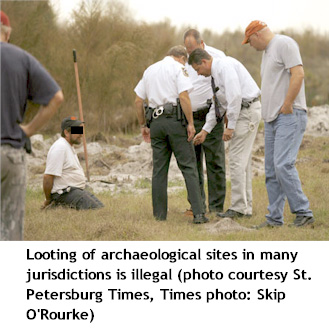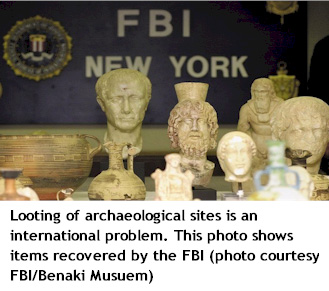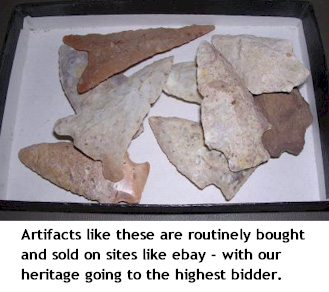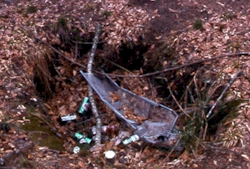|
 Collecting artifacts can be a controversial topic -- and with good reason.
Many collectors are looting our heritage. They are stealing from us all,
converting what belongs to all of us into their own private caches. But there
are others who are working equally hard to ensure that they are collecting not
only legally, but also ethically. This page will help answer questions about
collecting responsibly. You can also
download a
PDF version of this page. Collecting artifacts can be a controversial topic -- and with good reason.
Many collectors are looting our heritage. They are stealing from us all,
converting what belongs to all of us into their own private caches. But there
are others who are working equally hard to ensure that they are collecting not
only legally, but also ethically. This page will help answer questions about
collecting responsibly. You can also
download a
PDF version of this page.
Why Collect?
There are plenty of good reasons to collect archaeological artifacts.
Collectors have found many very important archaeological sites, helping
professional archaeologists to preserve these sites for future generations.
Collectors have also alerted professional researchers to sites being damaged or
destroyed by erosion, logging, or even development.
Careful collectors will also record information and preserve collections from
sites that are being destroyed -- ensuring that at least some of the information
the site contains is preserved. By providing information about the site and its
location to the professional community, these collectors are helping future
generations learn about their past.
 Thieves of Time Thieves of Time
But unfortunately, there are also unscrupulous collectors. Individuals whose
only interest in in the actual possession of the artifact. They aren't
interested in recording information about the site, or sharing information with
professional archaeologists. They are only interested in what an artifact is
worth, or how unique it is, or what they can trade it for. You see these
collectors buying and selling on web sites such as E-Bay all the time. Often
they will destroy archaeological sites, looking for a "perfect relic."
These people are thieves of time. By destroying archaeological sites they are
taking away a part of history that belongs to all of us and hoarding it for
their personal benefit or monetary gain.
Archaeological sites are fragile resources and these people waste and
squander our heritage.
What's the Law?
There are laws protecting some archaeological sites and
artifacts. For example, it is illegal to collect artifacts from any federal
lands, such as military bases, National Forests, or National Parks. In South
Carolina there are also laws that protect many archaeological sites, such as
those on state property. At least one town in South Carolina, Hilton Head
Island, has enacted a law protecting all of their archaeological resources,
making it illegal to disturb or collect sites.
While none of these laws protect archaeological sites on private property,
land owners have the right to protect archaeological resources just as they
would protect trees or other resources under their control.
 What About Private
Collections? What About Private
Collections?
Important artifacts in private collections may become nothing more than
curios or relics when they are traded or sold, because important information,
such as the site from which the artifact came, is often lost. When this happens
to an artifact, it loses most of its importance to posterity. Other tragedies
that befall private collections are fire, disposal by a disgruntled or
uninformed spouse, theft, or disposal by the collector's heirs who are unaware
of the scientific importance of the specimens.
These tragedies occur frequently enough to private collections that many
scientific journals are reluctant to publish papers based on specimens not
deposited in a museum for fear that future researchers won't be able to go back
to the original data. In fact, there are examples of important collections
published in the late nineteenth century or early twentieth century that are now
lost. For the scientific community, then, a non-profit, self-perpetuating museum
is considered the safest depository for archaeological collections.
 An Artifact with a
Future! An Artifact with a
Future!
How will donating artifacts to a museum benefit you? Not very much
materially, since the IRS places very little monetary value on artifacts. But
you will receive a letter acknowledging your gift, a copy of which will be
placed in the permanent accession file; your name will be acknowledged as the
collector if the specimen is published. Your children, and your grandchildren,
will be able to visit the museum to see the specimen you donated and the
documentation pertaining to it.
These benefits may not seem like much, but your artifact collection will be
preserved in your name for generations to come, and it will be available to
archaeologists from all over the world. You will have the satisfaction of
contributing to the cumulative store of human knowledge and of accomplishing
something that will outlive you as an individual. You will have made an
important contribution to the study of archaeology, and the story of your
collection will live on.
Will your collection achieve its scientific potential, or will it eventually
become a curio or someone else's trash?
For More Information
If you would like more information about the law, collecting artifacts, or
donating artifacts to museums you can contact any professional archaeologist or
museum near you. In South Carolina you can call or write any of these
institutions:
- Site Files Manager, SC Institute of Archaeology & Anthropology,
University of South Carolina, Columbia, SC 29208, 803-777-8170
- Director, Chicora Foundation, Inc., PO Box 8664, Columbia, SC 29202,
803-787-6910
- The Charleston Museum, Department of Historical Archaeology, 360 Meeting
St., Charleston, SC 29403, 843-722-2996
- S.C. State Museum, History Curator, PO Box 100107, Columbia, SC
29202, 803-737-4921
FAQs About
Looting and Archaeologists
I've heard that archaeologists will take collections away from people
if they report the finds.
Not true -- although if you broke the law collecting the remains
archaeologists are ethically required to report this to law enforcement.
But, if you collected the artifacts legally, archaeologists have no
authority -- or interest -- in taking collections away from legitimate
collectors.
Archaeologists just want collections to hoard the good stuff for
themselves.
Again, not true. First of all, it is
unethical for archaeologists to
collect personal artifacts -- such collecting would pose a significant conflict of
interest and archaeologists are obligated to curate all materials they
recover. In addition, most archaeologists have no more interest in
collecting artifacts than post office employees want to collect stamps. If
you have reason to believe that an archaeologist isn't curating collections
at a museum, you should contact your
state historic preservation office to
seek advice on how to report this for further investigation.
Everything in museums just gets put in a box and no one ever sees it.
It's true that museums can display only a small portion of their
collections at any one time. The reason for this is simple -- exhibits cost
money and few museums are funded by state or local government the way they
should be. If you are upset that exhibits don't change more often, complain
to your local government and demand that your museum get more public
funding. On the other hand, those materials put in boxes in storage and
still being cared for and are still available years later -- something that
no collector can promise about the relics in his curio cabinet.
Archaeologists don't get all the really good stuff at sites that are
being developed -- what's wrong with going in and getting what they leave
behind.
Archaeologists don't get all the "good stuff" for two primary reasons.
First, they are obligated to examine a variety of different site areas to
make certain they understand the site and, second, they are never given the
funds to fully investigate a site. So, like museums and exhibits, if you
want to see more archaeology, then you should write your congressmen and
legislators demanding more public money be devoted to archaeological and
historic preservation. Archaeologists object to sites being looted -- even
if they are to be developed -- because those looted artifacts tell no story
and only serve to increase the value of archaeological materials on the
black market. Looting gives artifacts monetary value, yet removes the
historic value and that encourages even more
looting.
I know of a site that was excavated and there was never anything
written about it -- how's that different from looting?
It isn't. Archaeologists are ethically obligated to write reports on all
projects they undertake, although sometimes lack of funds or other issues
can draw the process out. And they are obligated to make certain that those
reports are available to the public. That's why Chicora provides a
complete list of our publications on this web
site and also why we provide copies of our reports to the S.C. State Library
and other public facilities. While there are archaeological reports that
have not yet been published we know of no report by a site looter that has
ever been written and published!
Why aren't there better laws protecting archaeological sites if they
are so important?
That's a great question and we don't know the answer. Unfortunately our
law makers just don't seem able to recognize that our history and
archaeology is being frittered away and, before long, there simply won't be
any well preserved sites to study. If you feel there should be stronger
laws, write your state senators and representatives asking them this
question.
Aren't there sites everywhere -- how could losing a few here and there
make a difference?
Actually, no, archaeological sites aren't everywhere. And those worthy of
particular study and perhaps even preservation are even more scarce. For
example, on Hilton Head Island along the South Carolina coast there were
only about 20 antebellum plantations -- and most of these have now been
destroyed by development. We know of only one freedman's village on the
entire South Carolina coast (also on Hilton Head Island) and significant
portions of that site have now been lost. While it may seem that sites are
everywhere, they aren't. And without careful stewardship before long we will
have very little of our heritage left.
|